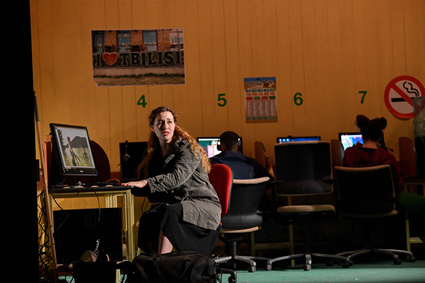| Opera Reviews | 20 April 2024 |
An interesting, if unfulfilling, eveningby Moore Parker |
|
| Cherubini: Médée
Salzburg Festival 16 August 2019 |
|

Elena Stikhina (Médée)
|
|
|
The action is transported to today’s Salzburg region, with contemporary features including background film sequences, live video transfers and voice messages to link and augment the plot, and with some of the work’s major confrontations taking place via telephone rather than face to face. While the lavish production with its finely-detailed sets (Bob Cousins) and costumes (Mel Page) well spans the vast scope of Salzburg’s Grosses Festspielhaus, the classic tragedy is here reduced to an all-too-familiar situation of domestic strife and drama (albeit one which stretches to murder and self-immolation) and furthermore, one draped within a framework of current immigrant-cultural disparities. Simon Stone’s direction is filled with clever moments of inspiration, opening optimistically and at times succeeding in concept - but ultimately resulting in a rather damp squib - unfortunately highlighted by an unconvincingly-shaped (and timed) finale in which Médée sets fire to her petrol-doused escape vehicle (and children) - unchallenged by a hapless Jason and an impotent police squad. Dramatic expression in the original French easily pales in comparison with the options intrinsic to the Italian-language version (memorable from the legendary annals of Maria Callas and her illustrious casts across several productions). As such (and considering the bounds of this current line-up), Stone was arguably shrewd to have compacted the concept to an everyday scale - rather than aim for unattainable heights of grandeur. Rosa Feola’s Dircé arguably saw the most all-encompassing rendering of the evening, with her well-projected tone and engaging reading scoring a fine hit. Less convincing, Alisa Kolosova’s bland Néris (despite a rich and well-produced mezzo), Vitalij Kowaljow’s wooden demeanour and undistinguished Créon, and Pavel Černoch’s small-scaled The Konzertvereinigung Wiener Staatsopernchor saw the sopranos stretched at times, but with the male sections vital in their contribution.
|
|
| Text ©
Moore Parker Photo © SF / Thomas Aurin |
|







